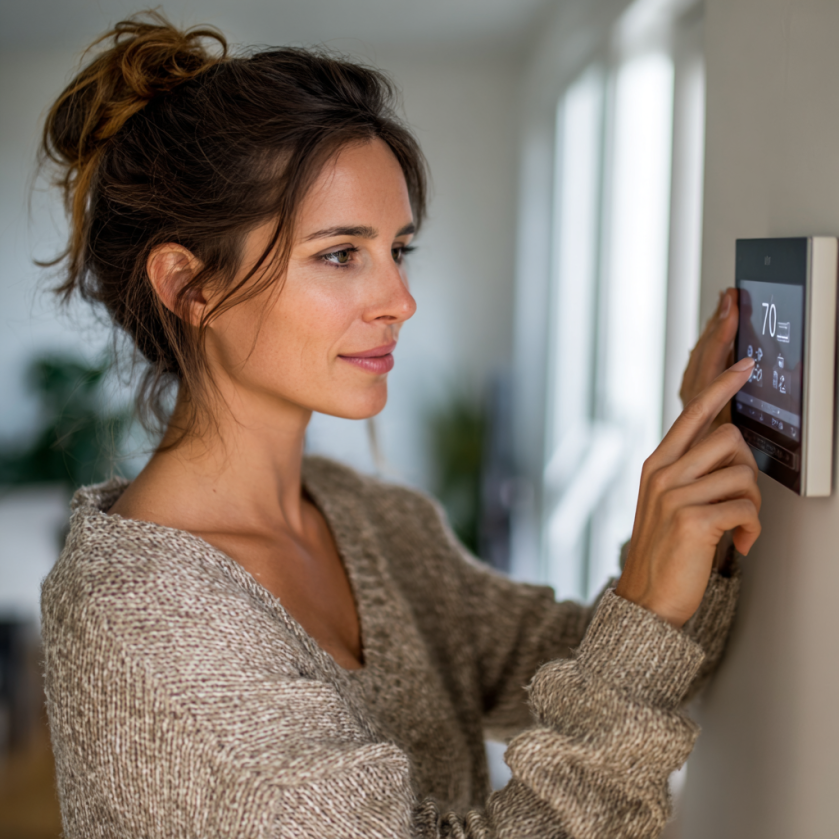Best Thermostat Settings for Comfort and Energy Savings on the Delmarva Peninsula

The good news? With the right settings, you can enjoy consistent comfort and cut heating and cooling costs by up to 10% annually (U.S. Department of Energy). This guide breaks down the best thermostat settings for every season, explains how smart thermostats — including Carrier models — maximize savings, and offers pro HVAC tips tailored to Delmarva homeowners.
Why Thermostat Settings Matter in Delmarva Homes
Delmarva’s coastal climate creates unique challenges for heating and cooling:
- High summer humidity forces your system to work harder to remove moisture.
- Cold winter winds demand consistent, efficient heating.
- Salt air corrosion can affect equipment over time, making efficiency more important.
Your thermostat acts as the command center. Proper settings mean your HVAC runs at peak efficiency without overworking — saving energy, reducing wear, and keeping your home comfortable.
Ideal Thermostat Settings by Season
The right settings vary throughout the year. By adjusting your thermostat with the seasons, you’ll maintain comfort while cutting costs.
Summer Settings for Comfort & Efficiency
For cooling season, the U.S. Department of Energy recommends 78°F when home and awake. If you’re away for more than four hours, increase the temperature by 7–10°F.
Pro Tips for Summer Efficiency:
- Use ceiling fans to create a cooling effect, making rooms feel 3–4°F cooler without lowering the thermostat.
- Keep blinds closed during the hottest parts of the day to block solar heat.
- Use dehumidifiers or set your AC to manage humidity for maximum comfort.
Winter Settings for Energy Savings
In heating season, aim for 68°F when home and lower by 7–10°F at night or when away. Each degree lowered can save around 1% on heating costs.
Pro Tips for Winter Efficiency:
- Use programmable schedules to warm the house just before you wake up or return home.
- Layer clothing and use blankets for comfort at lower temperatures.
- Ensure your HVAC filters are clean for better airflow and efficiency.
Spring & Fall Adjustments
In these “shoulder seasons,” outdoor temperatures are mild. Take advantage of:
- Natural ventilation: Open windows when humidity is low.
- Fan-only settings for circulation instead of running the AC or heat.
- Set thermostats closer to outdoor temps to reduce HVAC runtime.
Day vs. Night Settings
Temperature adjustments at night can significantly impact energy use.
- Summer Nights: Increase the thermostat 3–5°F above your daytime setting if you can sleep comfortably.
- Winter Nights: Decrease the thermostat 5–10°F below daytime settings. Heavy bedding and flannel sheets can maintain comfort.
Pro Tip: Sudden extreme changes (like turning the thermostat off completely) force your system to work harder later. Gradual adjustments are more efficient.
Smart Thermostats: A Game-Changer for Delmarva Homes
Smart thermostats make energy savings nearly effortless. Models like Carrier Infinity®, Carrier Ecobee Smart, and Carrier Cor® thermostats can learn your habits, adjust automatically, and even respond to Delmarva’s fluctuating humidity and temperature.
Advantages for Delmarva Homeowners:
- Weather-responsive adjustments: Carrier smart thermostats integrate local weather data for optimized performance.
- Remote control: Adjust settings from your phone or smart home system — ideal for weekend trips or sudden weather changes.
- Energy tracking: Carrier thermostats provide detailed energy usage reports to help homeowners make better decisions.
- Rebate opportunities: Maryland and Delaware utility companies often offer rebates for smart thermostat installation.

Tips for Maximizing Energy Efficiency
Even the best thermostat settings work better when your home is optimized for efficiency:
Use Ceiling Fans and Zoning
Fans improve air circulation, and zoning allows different areas of the house to have independent temperature control.
Seal Ductwork & Insulate
Leaky ducts can waste up to 30% of conditioned air. Ensure ducts are sealed and your attic or crawlspace is well insulated.
Schedule Regular HVAC Maintenance
Routine tune-ups keep your system clean, calibrated, and efficient — which makes every thermostat setting more effective.
Common Thermostat Mistakes to Avoid
Many homeowners accidentally waste energy due to common thermostat missteps:
- Over-adjusting: Constant manual changes force your HVAC to work harder.
- Turning the system off completely: In extreme heat or cold, this causes bigger spikes later.
- Ignoring humidity: Comfort is tied to humidity as much as temperature — set your system to manage both.
Final Takeaway
Optimizing your thermostat settings is one of the simplest ways to stay comfortable year-round on the Delmarva Peninsula without overspending. Pair these settings with Carrier’s smart thermostat technology and regular HVAC maintenance to see the biggest savings.
If you’re ready to improve your comfort and lower your bills, consider scheduling a seasonal HVAC tune-up with US Heating & Air. Our team understands Delmarva’s unique climate and can fine-tune your system for peak performance.
FAQs: Thermostat Settings for Delmarva Homes
What is the best thermostat setting to save money?
78°F in summer when home, 68°F in winter when home — adjusting 7–10°F when away can save up to 10% on bills annually.
How much can I save by adjusting my thermostat?
Each degree changed for at least 8 hours a day can save around 1% on your annual energy bill.
Should I turn my thermostat off when on vacation?
No. Set it higher in summer or lower in winter to save energy while preventing extreme indoor temperatures.
